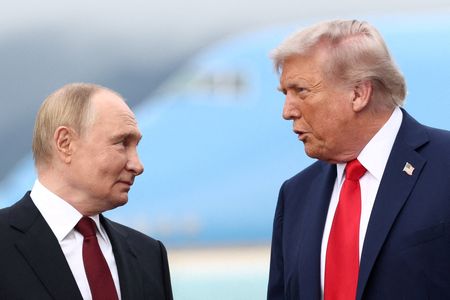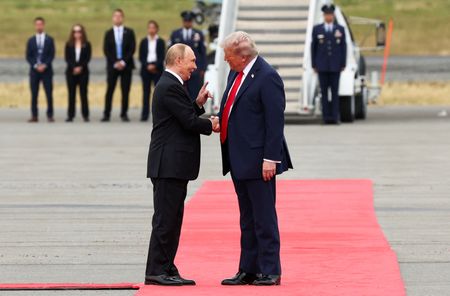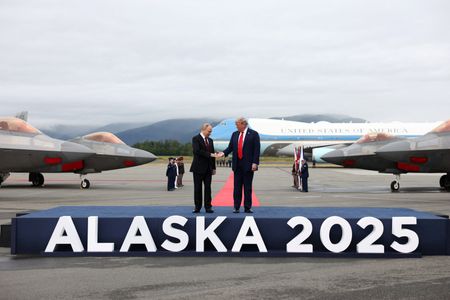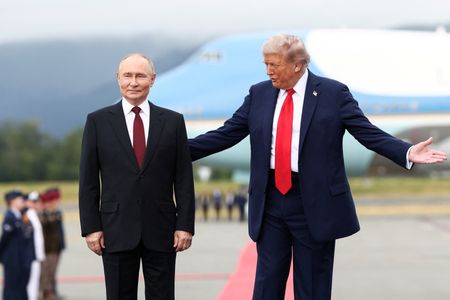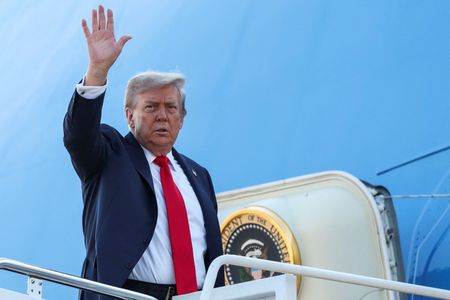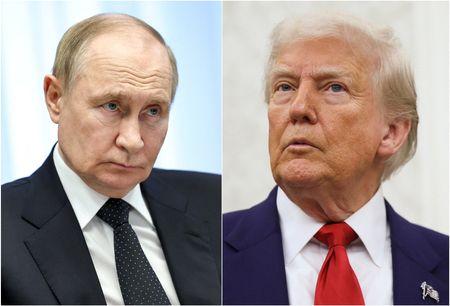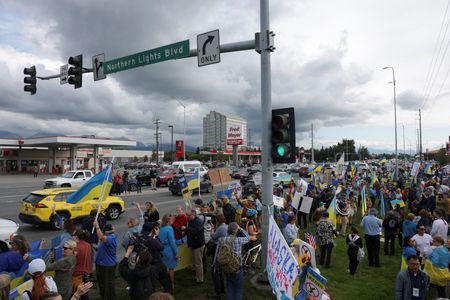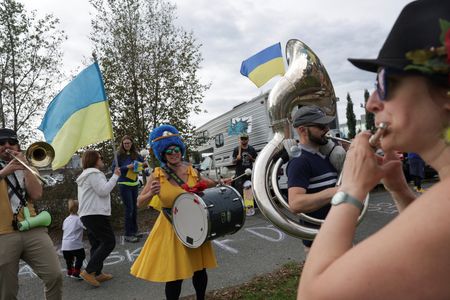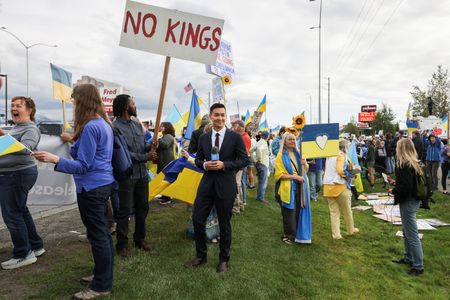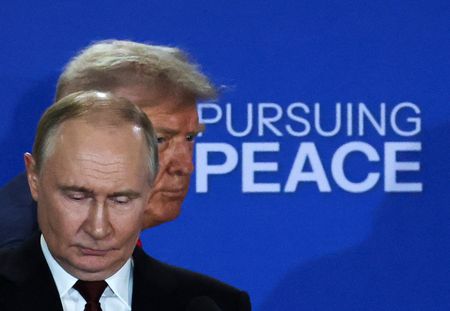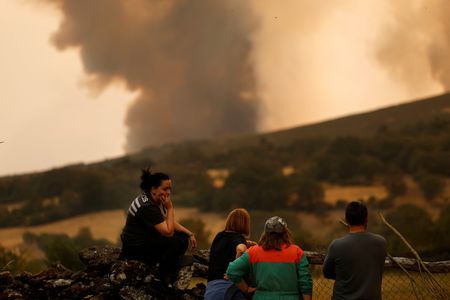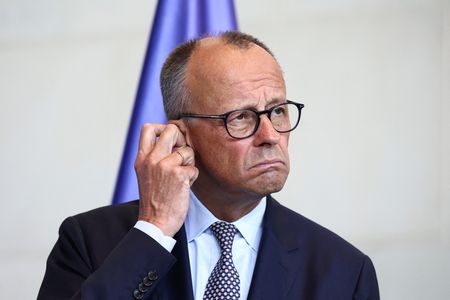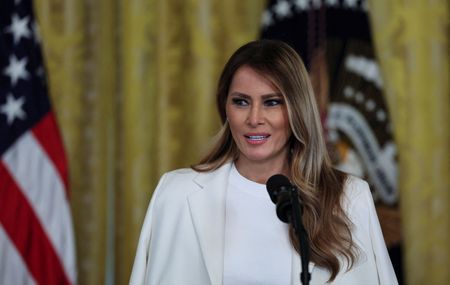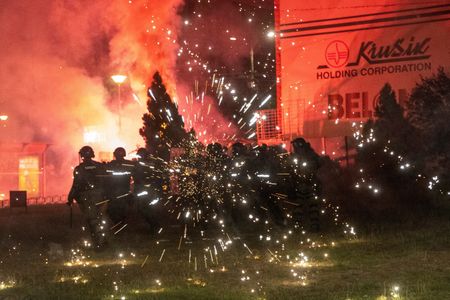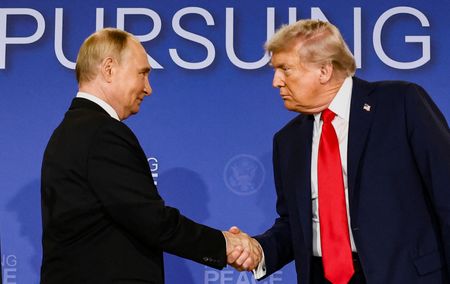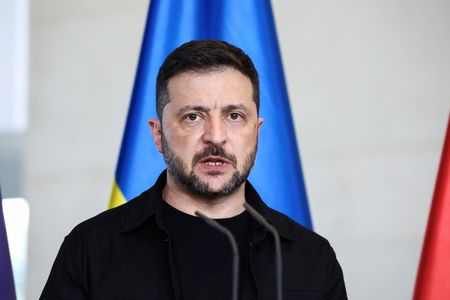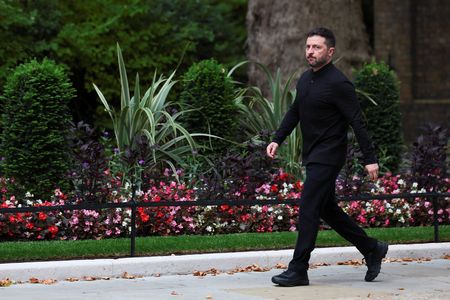By Steve Holland, Andrew Osborn and Yuliia Dysa
WASHINGTON/MOSCOW/KYIV (Reuters) -U.S. President Donald Trump said on Saturday Ukraine should make a deal to end the war with Russia because “Russia is a very big power, and they’re not”, after hosting a summit with President Vladimir Putin that failed to yield a ceasefire.
In a major shift, Trump also said he had agreed with Putin that negotiators should go straight to a peace settlement – not via a ceasefire, as Ukraine and its European allies, until now with U.S. support, have been demanding.
Ukrainian President Volodymyr Zelenskiy said he would travel to Washington on Monday, while Kyiv’s European allies welcomed Trump’s efforts but vowed to back Ukraine and tighten sanctions on Russia.
Trump met with Putin for nearly three hours in Alaska on Friday at the first U.S.-Russia summit since Moscow launched its full-scale invasion of Ukraine in February 2022.
“It was determined by all that the best way to end the horrific war between Russia and Ukraine is to go directly to a Peace Agreement, which would end the war, and not a mere Ceasefire Agreement, which often times do not hold up,” Trump posted on Truth Social.
RUSSIA LIKELY TO WELCOME TRUMP’S SHIFT
That statement will be welcomed in Moscow, which says it wants a full settlement – not a pause – but that this will be complex because positions are “diametrically opposed”.
Russia’s forces have been gradually advancing for months. The war – the deadliest in Europe for 80 years – has killed or wounded well over a million people from both sides, including thousands of mostly Ukrainian civilians, according to analysts.
Before the summit, Trump had said he would not be happy unless a ceasefire was agreed on. But afterwards he said that, after his talks with Zelenskiy, “if all works out, we will then schedule a meeting with President Putin”.
Monday’s talks will be held in the White House Oval Office, where Trump and Vice President JD Vance gave the Ukrainian leader a brutal public dressing-down in February, accusing him of ingratitude.
Zelenskiy said after speaking with Trump that he supported the idea of a three-way meeting.
But Putin signalled no movement in Russia’s long-held positions on the war, and made no mention of meeting Zelenskiy. His aide Yuri Ushakov told the Russian state news agency TASS a three-way summit had not been discussed.
NEED FOR SECURITY GUARANTEES FOR UKRAINE
In an interview with Fox News’ Sean Hannity, Trump signalled that he and Putin had discussed land transfers and security guarantees for Ukraine, and had “largely agreed”.
“I think we’re pretty close to a deal,” he said, adding: “Ukraine has to agree to it. Maybe they’ll say ‘no’.”
Asked what he would advise Zelenskiy to do, Trump said: “Gotta make a deal.”
“Look, Russia is a very big power, and they’re not,” he added.
Zelenskiy has underlined the need for security guarantees for Kyiv, to deter Russia from invading again in the future. He said he and Trump had discussed “positive signals from the American side” on taking part, and that Ukraine needed a lasting peace, not “just another pause” between Russian invasions.
Italian Prime Minister Giorgia Meloni said the most interesting developments of the summit concerned security guarantees for Ukraine inspired by the transatlantic NATO alliance’s Article 5.
“The starting point of the proposal is the definition of a collective security clause that would allow Ukraine to benefit from the support of all its partners, including the USA, ready to take action in case it is attacked again,” she said.
Putin, who has hitherto opposed foreign involvement in keeping the peace, said he agreed with Trump that Ukraine’s security must be “ensured”.
“I would like to hope that the understanding we have reached will allow us to get closer to that goal and open the way to peace in Ukraine,” Putin told a briefing where neither leader took questions.
“We expect that Kyiv and the European capitals … will not attempt to disrupt the emerging progress through provocation or behind-the-scenes intrigue.”
For Putin, the very fact of sitting down with Trump represented a victory. The Kremlin leader had been ostracised by Western leaders since the start of the war, and just a week earlier had faced a threat of new sanctions from Trump.
‘1-0 FOR PUTIN’
Trump also spoke to European leaders including Meloni after returning to Washington.
Several stressed the need to keep pressure on Russia.
British Prime Minister Keir Starmer said an end to the war was closer than ever, thanks to Trump, but added: “… until (Putin) stops his barbaric assault, we will keep tightening the screws on his war machine with even more sanctions.”
A statement from European leaders said “Ukraine must have ironclad security guarantees” and that no limits should be placed on its armed forces or right to seek NATO membership – key Russian demands.
Some European politicians and commentators were scathing.
“Putin got his red carpet treatment with Trump, while Trump got nothing. As feared: no ceasefire, no peace,” Wolfgang Ischinger, former German ambassador to Washington, posted on X.
“No real progress – a clear 1-0 for Putin – no new sanctions. For the Ukrainians: nothing. For Europe: deeply disappointing.”
Cold War historian Sergey Radchenko wrote: “Putin is a determined opponent, and, yes, he basically won this round because he got something for nothing.”
‘NEXT TIME IN MOSCOW’
Both Russia and Ukraine carried out overnight air attacks, a daily occurrence in the 3-1/2-year war, while fighting raged on the front line.
Trump told Fox he would now hold off on imposing tariffs on China for buying Russian oil, but that he might have to “think about it” in two or three weeks.
He ended his remarks after the summit by telling Putin: “We’ll speak to you very soon and probably see you again very soon.”
“Next time in Moscow,” a smiling Putin responded in English. Trump said he might “get a little heat on that one” but that he could “possibly see it happening”.
(Additional reporting by Kanishka Singh, Trevor Hunnicutt, Jeff Mason, Lidia Kelly, Jasper Ward, Costas Pitas, Ismail Shakil, Bhargav Acharya, Alan Charlish, Yuliia Dysa, Pavel Polityuk, Gwladys Fouche, Dave Graham, Paul Sandle, Joshua McElwee, Andreas Rinke, Felix Light and Moscow bureau; Writing by Kevin Liffey, Mark Trevelyan, Joseph Ax and James Oliphant; Editing by Raju Gopalakrishnan and Gareth Jones)

